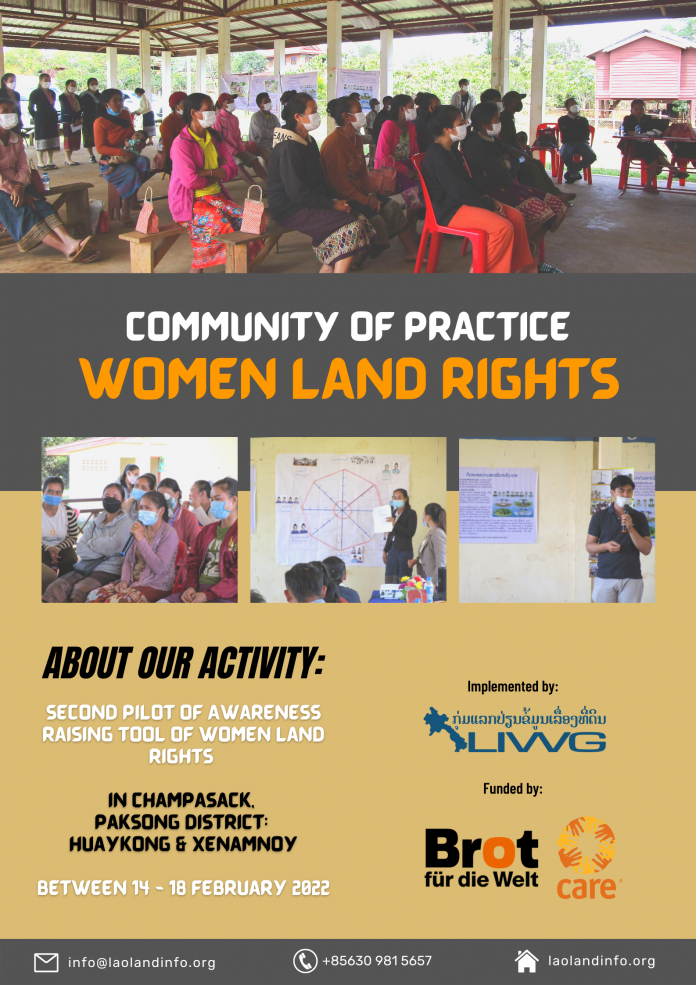
By LIWG
—————————–
How and where was the second pilot conducted?
Following the first awareness raising tools’ pilot activity of the community of practices (CoP) in women land rights (WLR) in Oudomxay (Read Uodomxay story: https://bit.ly/3x2wJeT), the CoP team continued with a second pilot in Helvetas’ project site, in Paksong district, Champasack province, in the south of Laos. This pilot was conducted in 2 villages: Huaykong and Xe namnoy.
While the 2 villages are located in the same district, they have different backgrounds. Huaykong, the first village is an old village which has passed for many generations. It is populated with about one thousand five hundred people, all from Ya Huen ethny. It is located at 35 Km from the city. The village has easy access to good roads and markets while Xe namnoy is a resettled village from different small villages. People relocated from the Xe Pian-Xe Namnoy Power Plant construction areas after the dam collapsed in July 2018. The village is located about 45 Km from the city. The population in this village is populated with more than seven hundred people, 70% are Ya Huen and 30% Laven. Only few villagers speak Lao, the official language and only a few understand Lao language as well.
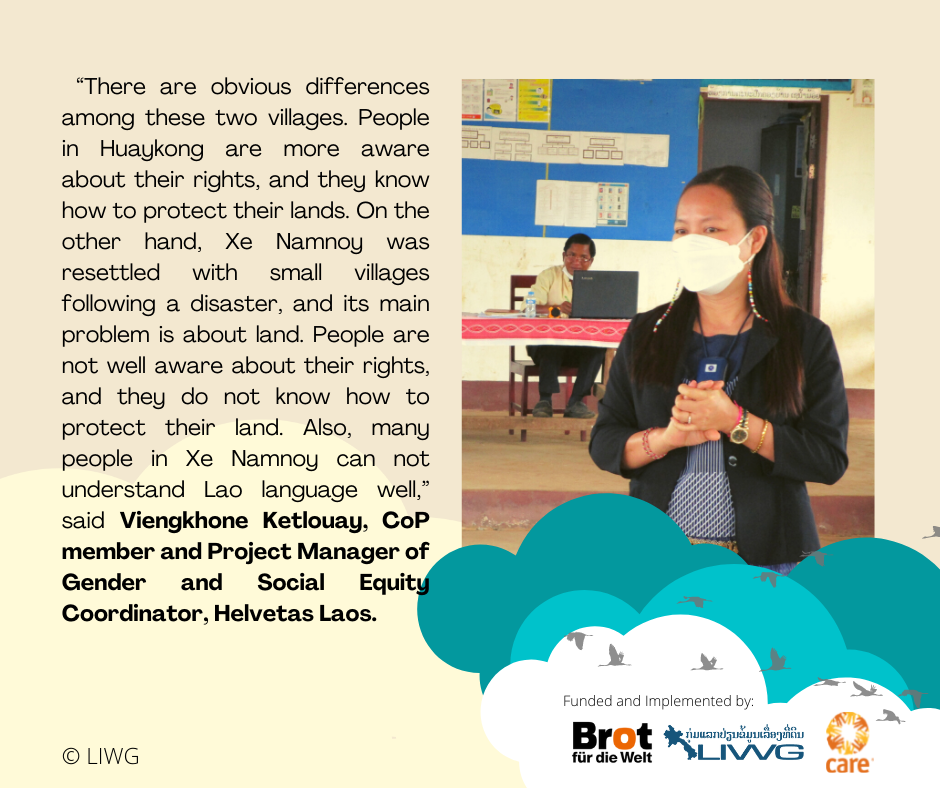
Though, these 2 villages have some backgrounds in common. People in these 2 villages widely produce agricultural products, which are mainly coffee and tapioca. Additionally, in the past years, Helvetas Laos has done many activities related to gender equalities, non-violence to women and dissemination of non-violence law to women and children.
It was a good opportunity for the CoP team to pilot the awareness raising tools in areas with different background and history, as well as level of people’s awareness regarding their land rights and gender equality.
How was it implemented?
The second pilot was conducted in 2 villages of Ban Huaykong and Ban Xe Namnoy in Paksong district, Champasack province from the 14th to 17th of February 2022.
There are several parties involved in this activity from different organizations such as the secretariat of Land Information working Group (LIWG), Helvetas Laos, gender experts, ADWLE, GDA, and representatives from the government, such as the Ministry of Natural Resources and Environment (from DoL), the University of Laos (Women’s Studies Center, Faculty of Social Science), the Lao Women Union at district level, and village authorities from Huaykong and Xe Namnoy.
For the second pilot, the CoP team still keeps the 3 main activities with some adapted transitions. The CoP members fully engaged in facilitating the awareness raising activities as the facilitation guide such as Activity 1: Get Familiarized with the Community on gender and land use information, Activity 2: Create an Understanding of Gender on Land and Analyze the Impacts – Benefits, and Activity 3: Laws and Regulations Regarding Land and Gender.
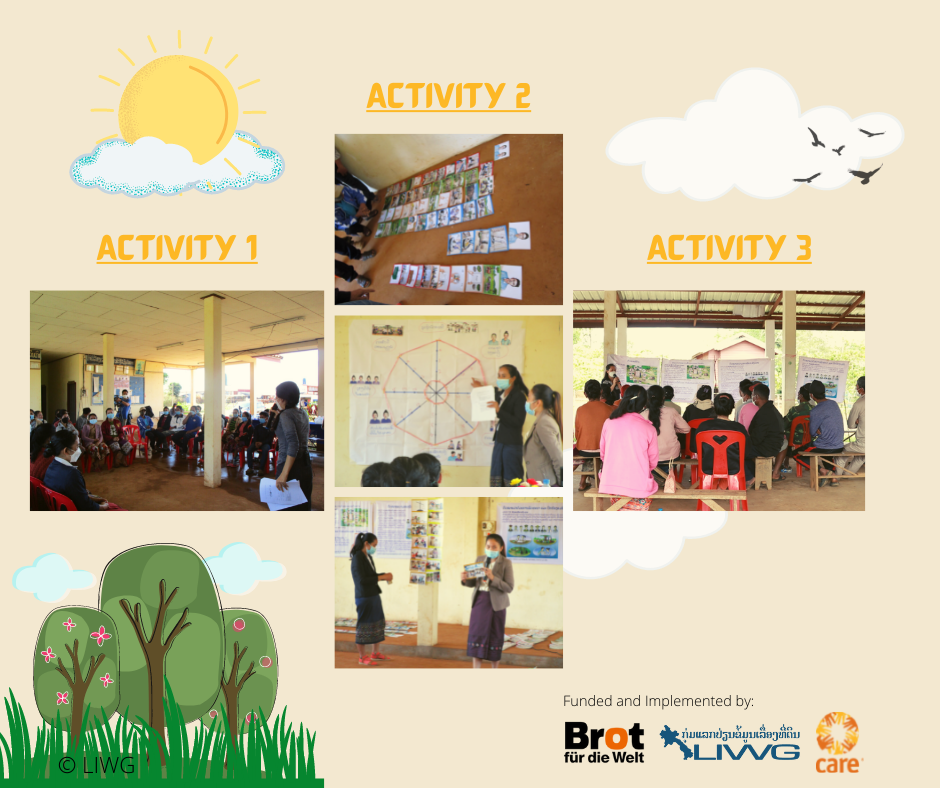
Many villagers participated in this pilot. There were 43 participants in Huaykong and 37 participants in Xe Namnoy. The CoP team coordinated closely with the village authorities to engage villagers to join the activity and tried to balance between women and men. This is really an important part to this activity because we would like to encourage the women to speak up and be aware of their rights. Besides this, we wanted to hear opinions from both women and men regarding land rights and gender equality in their communities. We had plenty of feedbacks and opinions from the participants.
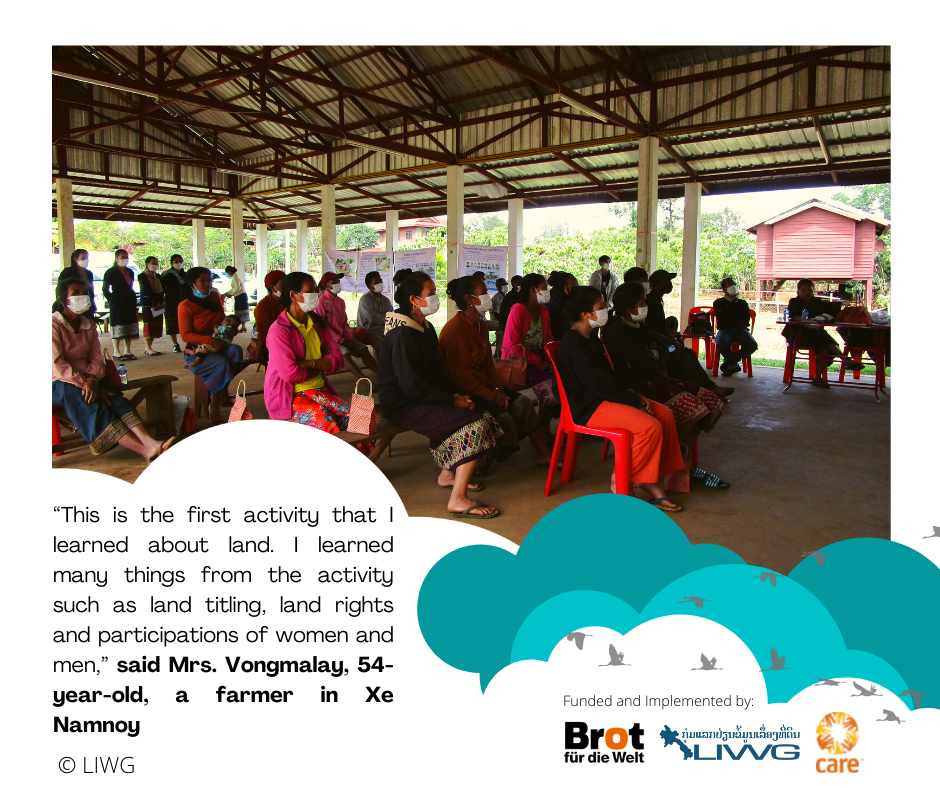
Along the activity, the villagers fully participated and paid attention in learning, sharing, and discussing with facilitators and authorities. With different activities, the participants shared different opinions of their preference towards the activities.
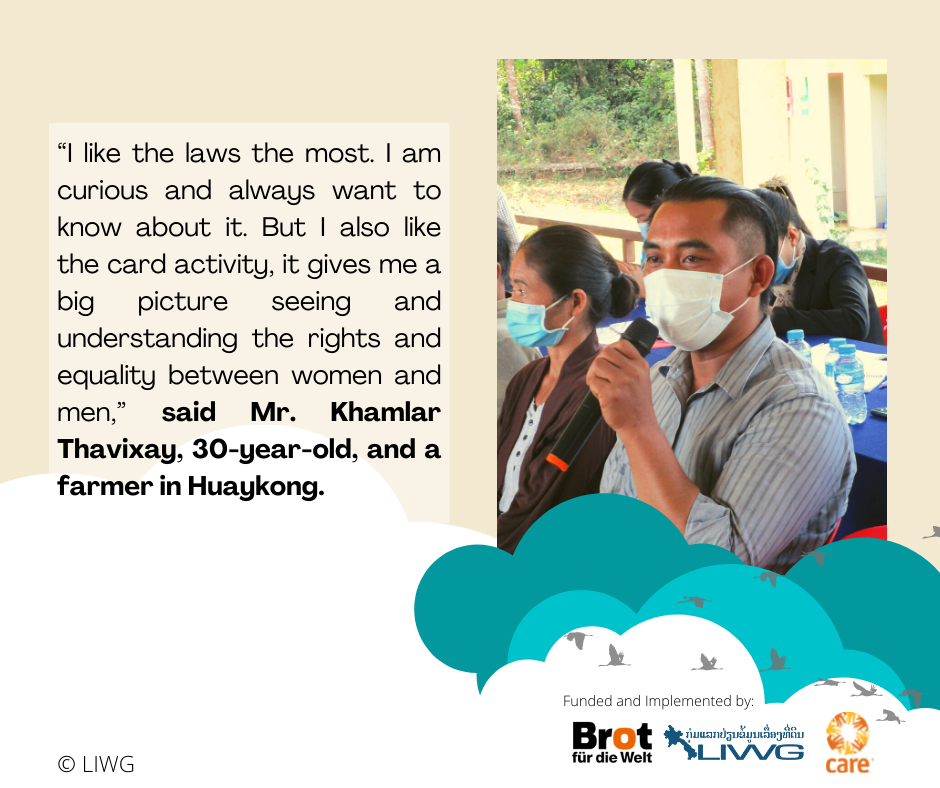
From the sharing session with the participants, we found that there is a big difference between 2 villages concerning land. Huaykong has been managing well on land allocations, and people are aware of their rights and gender equality on land. They put both husband’s and wife’s name on their land title. Parents make decision together when giving land to their children. Differently, Xe Namnoy’s main issue is land. Few families own land certificates, and many people do not have enough land for livelihood. Their cultivation lands are far from the village. They need to walk about 2 or 3 Km to reach their cultivation lands. There are also conflicts between relocated villagers and people who have been living there before. During the session, the villagers asked when they would have their land certificates and more lands. They are patiently waiting for supports and solutions from district authorities.
I will be waiting for the district to come and help with the land titling. Because now I still have no land title, so it is a big hope for me
Mrs. Vongmalay, 54-year-old, a farmer in Xe Namnoy.
What change could this activity bring to the community?
Even though, these 2 villages have participated in many activities organized by Helvetas Laos, this pilot of CoP in women land rights is a significant point for participants in 2 villages to realize and understand more about land issues in regard to gender equality in the communities. We discovered that women felt more empowered and encouraged to speak up for their rights and equality. Moreover, we had good cooperation from men. They listened and opened up for women’s opinions and did not try to discourage others. Besides, they helped provide information and gave promise to get involved in gender equality issues. This is the testimony and proves that the CoP in women land rights’ activity has shown out good impacts and potentials to bring changes into the communities.
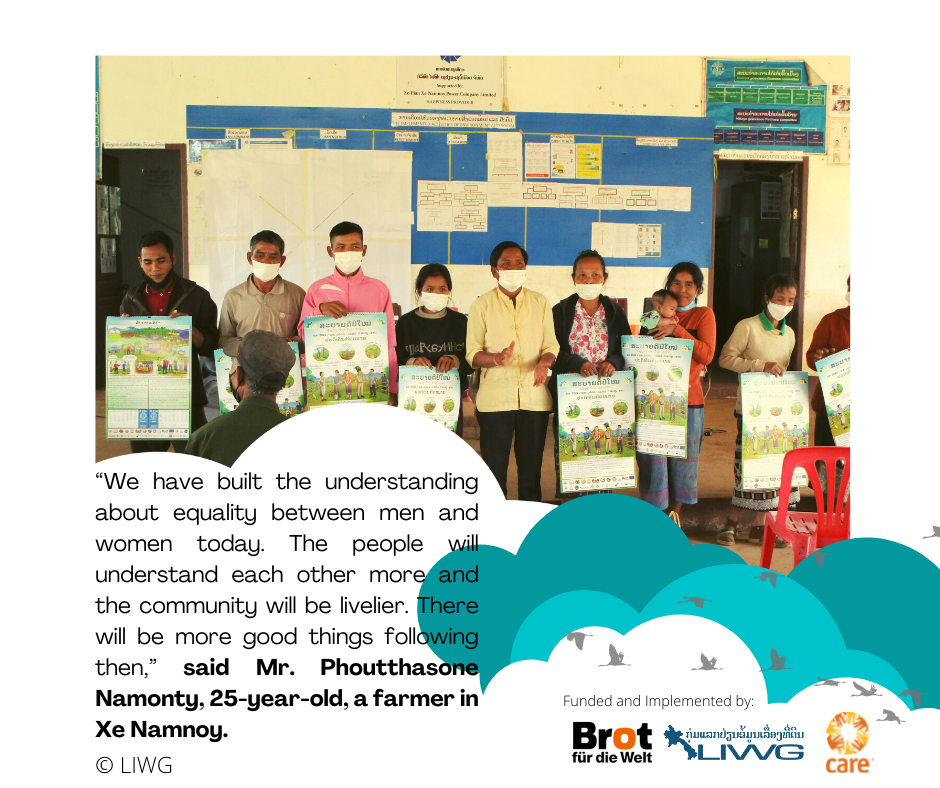
Obviously, joining the activity has lit up awareness among participants from 2 villages, and they expect changes to happen as regards land rights and gender equality. In the attempt to make it happen, all people need to have their awareness raised and become open-minded about equality to everyone’s rights in the community.
I will be very happy if all people in this community realize how important this activity is. This will bring a lot of changes into my community. There will be no discriminations among villagers or neighbors. Everyone will respect each other and the equality will happen
Mr. Khamlar Thavixay, 30-year-old, a former soldier and a farmer in Huaykong
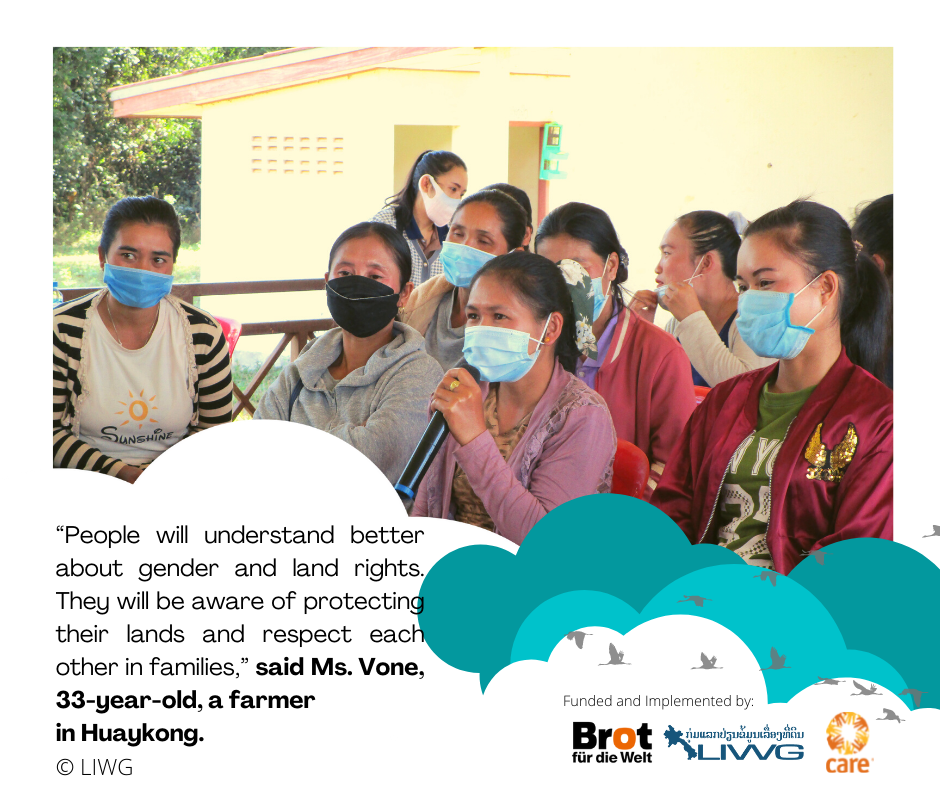
What lesson learned did we find out?
The second pilot implementation in Paksong, Champasack province, was really informative and built the knowledge of the CoP members on how to use the awareness raising tools developed in different situation. This is a remarkable step for those who are seeking for the right approach to land rights and path to gender equality. In addition, this is also a good opportunity for CoP members to learn and create understanding the issues and bring back useful lesson-learnt for themselves.
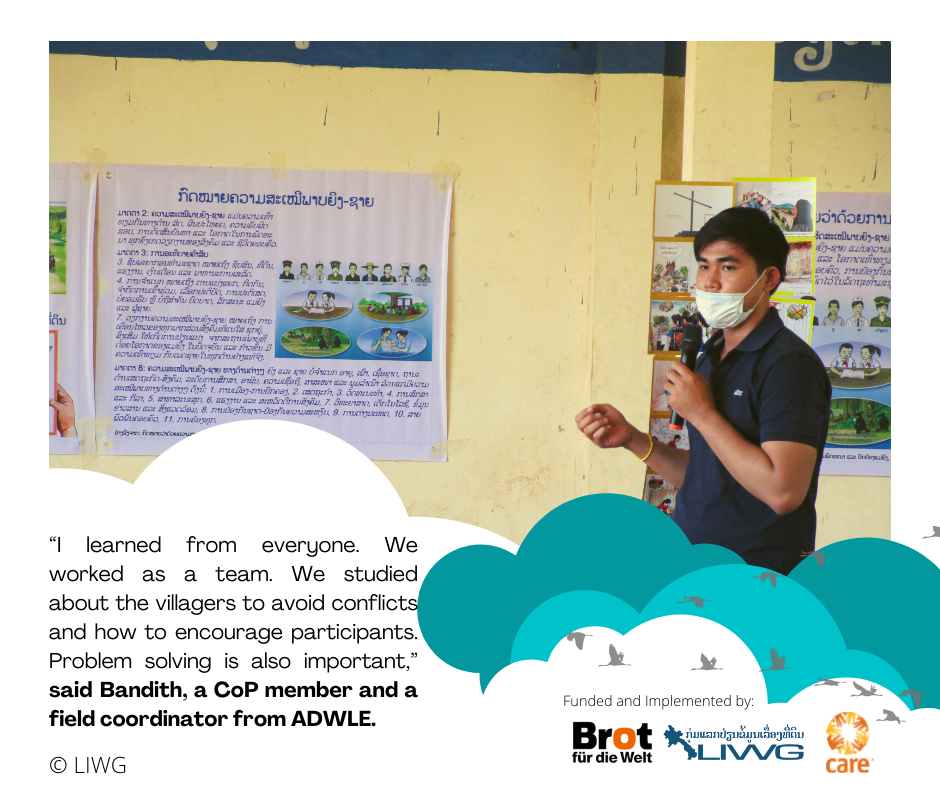
In addition to this, it is a useful prospect for CoP members to get involved in, facilitate, and implement all activities in this CoP team, for they can bring back tools and adapt into their work field for further beneficial outcomes to other communities.
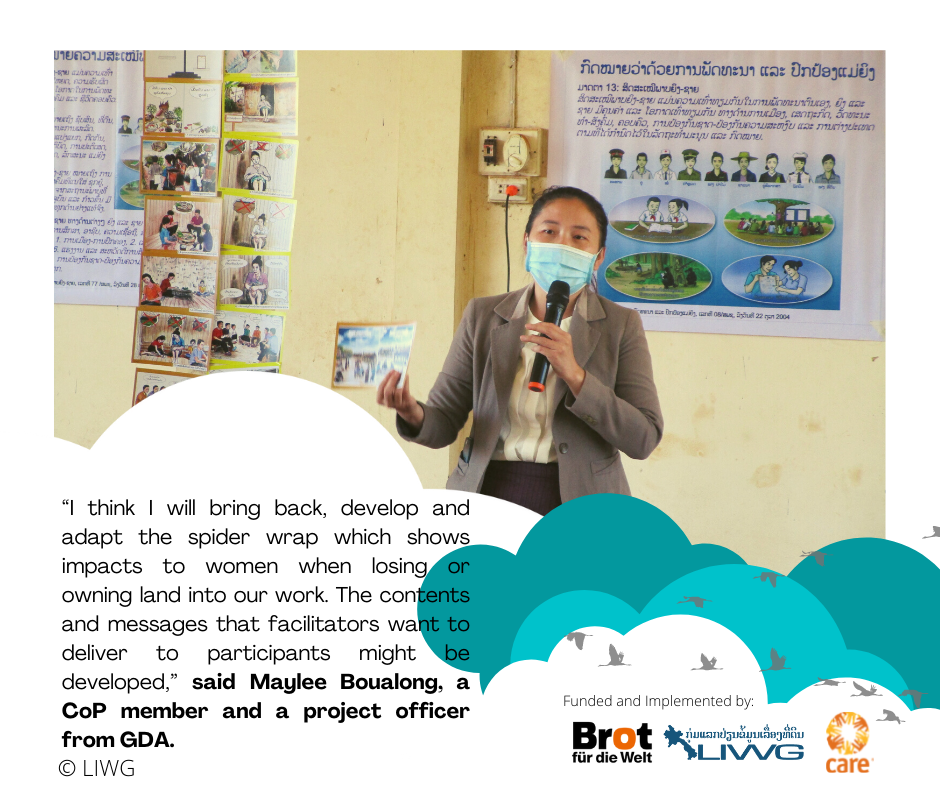
However, it does not mean that only one activity will change things or remaining issues completely. Everyone in position of power as well as villagers in the community has an obligation to rise up awareness on land and gender. This requires long-term practices; therefore, everyone needs to learn and deeply apply in their daily lives with participation from all parties.
Thank you for reading our story!


